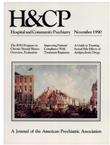From Noncompliance to Collaboration in the Treatment of Schizophrenia
Abstract
Although effective treatment for schizophrenia is available, patients' compliance with treatment prescriptions is notoriously poor. The authors reframe compliance as a collaborative relationship in which both the patient and practitioner assume responsibility for producing a treatment regimen to which the patient can adhere. Barriers that prevent a partnership in treatment may be related primarily to treatment techniques, to characteristics of the patient and his family, to the patient-clinician relationship, or to the treatment delivery system. A comprehensive approach to addressing these sources of noncompliance includes specific skills that can be acquired by the patient, family members, and the practitioner.
Access content
To read the fulltext, please use one of the options below to sign in or purchase access.- Personal login
- Institutional Login
- Sign in via OpenAthens
- Register for access
-
Please login/register if you wish to pair your device and check access availability.
Not a subscriber?
PsychiatryOnline subscription options offer access to the DSM-5 library, books, journals, CME, and patient resources. This all-in-one virtual library provides psychiatrists and mental health professionals with key resources for diagnosis, treatment, research, and professional development.
Need more help? PsychiatryOnline Customer Service may be reached by emailing [email protected] or by calling 800-368-5777 (in the U.S.) or 703-907-7322 (outside the U.S.).



